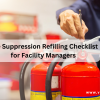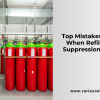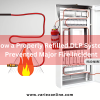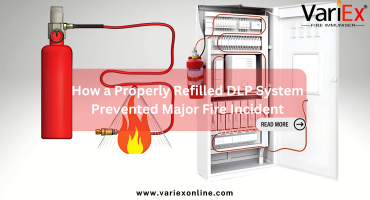![]()
Fire Immuniser
+91-7829629111
Email: info@variex.in
Varistor Technologies Pvt. Ltd.
Block-1, First Floor, Ardente Office One, Hoodi Circle, ITPL Main Road, Bengaluru, Karnataka 560048, IN
Most Common Fire Extinguisher
Fire extinguishers are essential tools for quickly and effectively combating fires in various settings. Understanding the most common types of fire extinguishers, their classifications, and their suitable applications is crucial for proper fire safety preparedness. Here's a comprehensive guide to the most common types of fire extinguishers: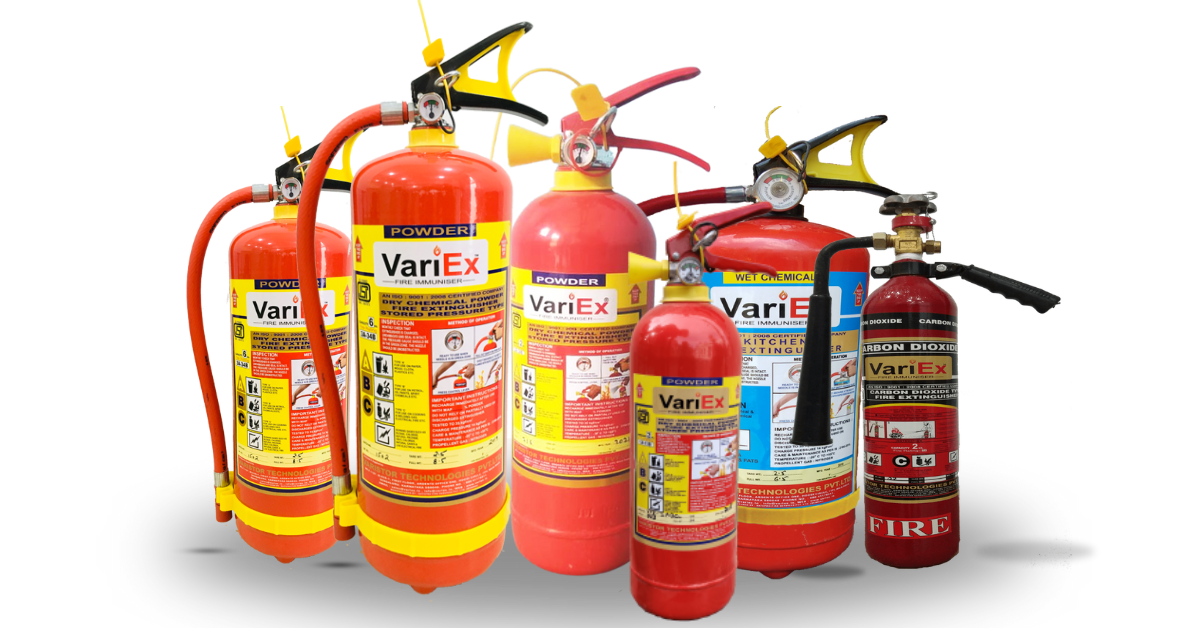
1. Water-Based Fire Extinguishers (Class A):
- Water-based extinguishers are the most common type and are suitable for Class A fires involving ordinary combustible materials such as wood, paper, cloth, and plastics.
- They work by cooling the fuel below its ignition temperature and are typically identified by a solid red label.
2. Dry Chemical Fire Extinguishers (Class ABC):
- Dry chemical extinguishers are versatile and effective against Class A, B, and C fires, making them widely used in various environments.
- They contain a dry chemical powder that interrupts the chemical reaction of the fire and forms a barrier between the fuel and the oxygen.
- Dry chemical extinguishers are often labeled with a blue label with a white band and are available in various types, including ABC multipurpose, BC (for flammable liquids and gases), and ABC powder for more comprehensive coverage.
3. Carbon Dioxide (CO2) Fire Extinguishers (Class BC):
- CO2 extinguishers are effective for Class B and C fires involving flammable liquids and electrical equipment.
- They work by displacing oxygen, suffocating the fire, and leaving no residue behind. CO2 extinguishers are commonly used in areas with sensitive equipment due to their non-conductive properties.
- CO2 extinguishers are typically identified by a black label or a red label with a black band.
4. Foam Fire Extinguishers (Class AB):
- Foam extinguishers are effective against Class A and B fires, making them suitable for extinguishing flammable liquids and ordinary combustible materials.
- They create a foam blanket that suppresses vapors and seals the fuel surface to prevent re-ignition. Foam extinguishers are often used in warehouses, garages, and industrial settings.
- Foam extinguishers are typically labeled with a cream label or a red label with a cream band.
5. Wet Chemical Fire Extinguishers (Class K):
- Wet chemical extinguishers are specifically designed for Class K fires involving cooking oils and fats in commercial kitchens.
- They work by creating a soapy layer that suppresses the fire and prevents re-ignition. Wet chemical extinguishers are crucial for protecting kitchen staff and preventing kitchen fires from spreading.
- Wet chemical extinguishers are typically identified by a yellow label or a red label with a yellow band.
6. Clean Agent Fire Extinguishers (Class ABC):
- Clean agent extinguishers use non-conductive, volatile gases that leave no residue, making them ideal for protecting sensitive electronic equipment, data centers, museums, and archives.
- They work by interrupting the combustion process without causing damage to delicate materials or leaving behind corrosive residues.
- Common clean agents include HFC-227ea (Heptafluoropropane) and FM-200 (HFC-227ea with additives). These extinguishers are typically labeled with a green label or a red label with a green band.
7. Halon Fire Extinguishers (Class ABC):
- Halon extinguishers were once widely used for Class A, B, and C fires due to their effectiveness and non-conductive properties.
- However, halon is an ozone-depleting substance, and its production has been phased out under international agreements. Existing halon extinguishers may still be found in certain critical applications but are being replaced by more environmentally friendly alternatives.
8. Water Mist Fire Extinguishers (Class A):
- Water mist extinguishers use a fine mist of deionized water to cool the fire and displace oxygen, making them effective against Class A fires.
- They are particularly useful in environments where water damage is a concern, such as museums, libraries, and offices with sensitive equipment.
- Water mist extinguishers are identified by a white label or a red label with a white band.
9. Wetting Agent Fire Extinguishers (Class A):
- Wetting agent extinguishers use a biodegradable, synthetic foam solution that breaks the surface tension of water, allowing it to penetrate deep-seated fires more effectively.
- They are suitable for Class A fires involving wood, paper, cloth, and other ordinary combustible materials.
- Wetting agent extinguishers are typically labeled with a blue label or a red label with a blue band.
10. Dry Powder Fire Extinguishers (Specialized Classes):
- Dry powder extinguishers are available in specialized formulations for combating specific fire hazards, such as Class D fires involving combustible metals like magnesium, titanium, and lithium.
- These extinguishers use dry chemical powders specifically designed to smother metal fires by forming a crust over the burning material.
- Dry powder extinguishers for Class D fires are often labeled with a yellow label
Understanding the most common types of fire extinguishers and their applications is essential for selecting the right extinguisher for specific fire hazards. Regular maintenance, proper training in extinguisher operation, and adherence to safety protocols are crucial for effective fire prevention and response.
Frequently Asked Questions
Fire extinguishers are used to suppress or extinguish small fires in their early stages, preventing them from spreading and causing further damage or injury.
Select a fire extinguisher based on the types of fire hazards present in your environment. Consider the fire classes it is rated for, such as Class A (ordinary combustibles), Class B (flammable liquids), Class C (electrical), or Class K (cooking oils and fats).
Fire extinguishers come in various types, including water-based, dry chemical, carbon dioxide (CO2), foam, wet chemical, clean agent, halon, water mist, wetting agent, and dry powder extinguishers. Each type is designed for specific fire classes and applications.
Fire extinguishers should be inspected monthly by visually checking the pressure gauge, verifying the tamper seal, and ensuring the extinguisher is in its designated location. Professional inspections and maintenance should be conducted annually.
While anyone can use a fire extinguisher in an emergency, proper training is essential to ensure effective and safe operation. Training programs cover how to select the appropriate extinguisher, operate it correctly, and implement proper firefighting techniques.
Final Say
We at VariEx.in or Variexonline.com have mastered the art of designing, installing, inspecting, and fixing automatic sprinkler systems with the help of our in-house team, which is capable of delivering the fire sprinkler services you need, whether large or small and at affordable cost.
To schedule a fire sprinkler installation, or you think our services could benefit your commercial property, contact us online or give us a call at, 7829629111
"WHAT YOU CAN READ NEXT"
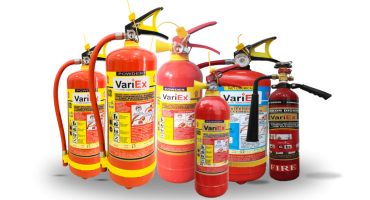 Read more +24 November 2023 in Fire Extinguisher
Read more +24 November 2023 in Fire ExtinguisherWhat types of fire extinguishers are available for different fire classes?
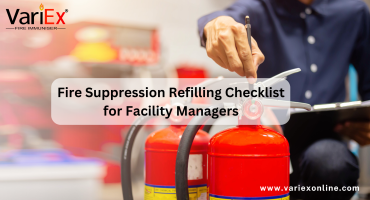 Read more +28 April 2025 in Fire Suppression
Read more +28 April 2025 in Fire SuppressionFire Suppression Refilling Checklist for Facility Managers
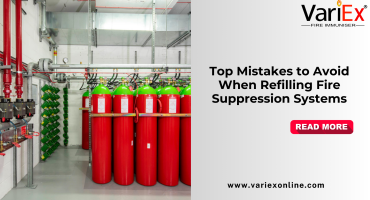 Read more +25 April 2025 in Fire Suppression
Read more +25 April 2025 in Fire Suppression

